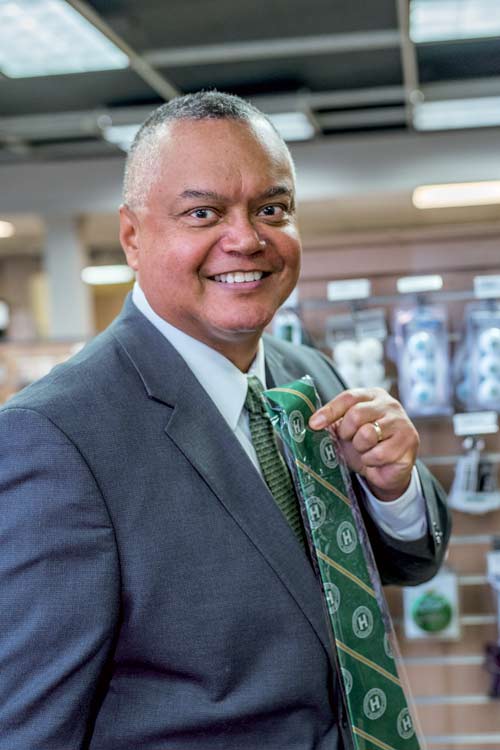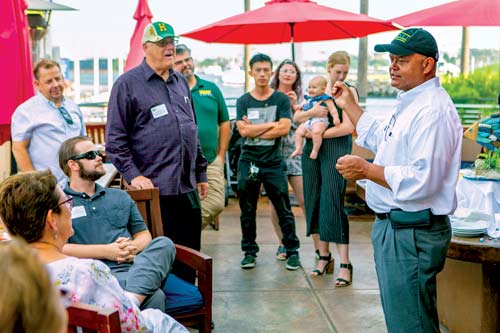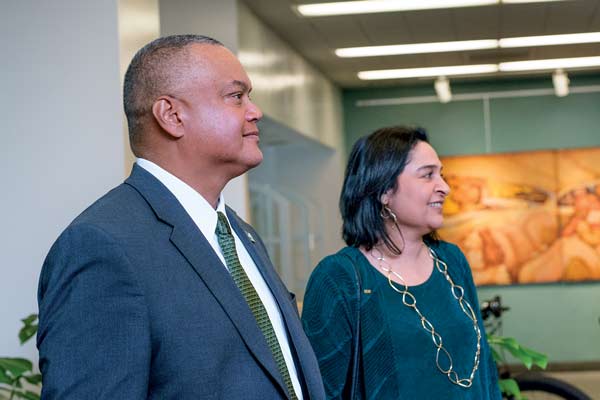Opportunity, Optimism, and the Humboldt Experience
A Chat with New President Tom Jackson, Jr.
•••
By Aileen Yoo

Getting into the Lumberjack spirit, President Jackson browsed the HSU Bookstore for Humboldt merchandise.
“A positive, meaningful educational experience.” You’ll hear Humboldt’s new president, Tom Jackson, Jr., say this often. It seems to be his mantra. And it reflects his core philosophy of what higher education should be—a place where students can explore their intellectual and personal potential. It also fits with his positive approach to his life and work.
President Jackson's own education is rooted in possibilities and positive thinking. Under the laws of her era and the state she lived in, Jackson’s grandmother, a woman of color, could not pursue an education beyond the eighth grade. He says she dreamed her children would get their high school diplomas, which they eventually did. She even saved a collection of books she hoped they would someday read, which Jackson now keeps as a family treasure.
Just two generations from that dream, Jackson is the eighth president of Humboldt State and its first African American president.
Looking ahead, he knows there’s work to be done at Humboldt. He is focused on recruitment, retention, reigning in spending, and reconnecting with the local community. As a glass-is-half-full kind of person, he’s also focused on celebrating Humboldt’s strengths.
He's moving fast, and the first clues about this came early. Just four hours after Jackson was named president by the CSU Board of Trustees, he and his wife Mona were at Humboldt hosting a casual gathering for the campus community in the Library.
He also enjoys the part of the job that involves getting out and talking with people, and you can never be quite sure where he will appear. One time he dropped by Humboldt’s annual girls basketball camp and talked about pursuing dreams, and he has seized plenty of other chances to chat with young people. He has also made surprise visits to the Mad River Union newsroom, Fortuna Rodeo, county Folklife Festival and more.
Jackson’s outings on campus and in the community—as well as his quiet, apparently boundless energy—reflect a joie de vivre he says he learned from his parents. And as both a parent and the first in his family to earn a college degree, Jackson appreciates the hopes families have for their students, as well as the hopes students have for themselves.
In a wide-ranging Q&A with Humboldt magazine, President Jackson reflects on these aspirations, outlines his priorities for the University, and discusses how those priorities will help students achieve their educational goals. The interview has been edited for length.
In the few months you’ve been here you’ve been getting to know the community. What are your impressions of HSU and Humboldt County?
I remember driving with a colleague back to Arcata after a tour of the Scotia lumber mill. We were on Highway 101, near Rio Dell, when I saw a stretch of redwoods, sky, and bluffs. I already knew Humboldt was beautiful, but the landscape in this particular location was stunning. It reminded me of how unique Humboldt truly is, not because of the things we do but because of where and who we are as a community.
And a crucial component of the community is this amazing place called Humboldt State University. People here are trying to make a difference for students who have entrusted us to provide them the best education possible. We carry that on our shoulders as a community that wants to support our students, so they can go into the world to create a better society.
You often talk about providing a “positive, meaningful educational experience” for students. Can you elaborate on that?
When we bring a child into the world and hold them in our hands as infants, we have high hopes for them. As parents, we do everything we can to help our sons and daughters lead happy, healthy, and meaningful lives.
Similarly, HSU will do all it can to help our students succeed because, in my mind, if they’re good enough to get into this university, then we have to be good enough to keep them.
What I mean by that is this: We’re not in the business of weeding out students because the one we weed out might be a late bloomer. Think about that for just a moment. Everyone grows at different points in their lives. Imagine if we were all judged by our abilities when we were at 18 or 19 years of age.
And imagine the one that we’ve removed from this university who could have created the third generation of the microgrid. That’s why we as a university have to be really good at retaining students.
In today’s educational environment, universities need to embrace what I see as a coaching agreement. It’s an unspoken understanding that while students are expected to study hard and make the effort, we need to mentor them to success.
“We’re not in the business of weeding out students because the one we weed out might be a late bloomer. ... Everyone grows at different points in their lives. Imagine if we were all judged by our abilities when we were at 18 or 19 years of age.”
Let’s work with students one-on-one and provide opportunities beyond the classroom. Let’s provide field research, hands-on learning, volunteering, and academic and social resources—all the things HSU is known for and that make this campus special.
So, from the moment students step foot on campus to the day they walk across the stage at commencement and become alumni, our hope is that they’ll flourish in a supportive, global, and engaging culture of learning. Our hope as parents is that they’ll gain knowledge, meet new people, and challenge themselves to do new things in order to become the people that we hoped they would be. We need to provide students a positive, meaningful educational experience that we would want our own children to have. That’s the unwritten deal between a university, students, and their families.
Why is HSU a good fit for you and your family?
HSU embodies what my wife and I have always valued: a very strong university in a small-town community in a beautiful place. Our careers have taken us to places where we weren’t lost in the shuffle of urbanness and where we were part of the community—such as Black Hills State University, where I was previously president. We had neighbors we knew and hung out with as colleagues and friends. We knew Humboldt would be all those things and embrace us and welcome our children. Also, my wife grew up in Virginia and I grew up in western Washington, so we’ve always been around trees, water, and mountains. When we saw and experienced Humboldt, we were all in!
Can you talk about your roots and the people who helped shape your world view and the person you are today?
My parents, my sister, foster brother, and my closest friend, Bud, were very influential. My father was an electrician, a humble man with a unique sense of humor—things that are hiding in me somewhere. My mother was a free spirit and willing to experience life in ways that most wouldn’t allow in the ‘50s and the ‘60s. My parents taught us that we all have responsibilities, but they also reminded us to have fun and break the rules from time to time. I try to embrace those lessons and enjoy life, knowing that every morning, I get to decide if it’s going to be a good or bad day.
But when I think about my challenges, I recognize they’re nothing compared to the ones my parents experienced. Here’s a tall African American man married to a petite Filipino Native American Irish Canadian woman in the 1950s. They first lived in Missouri, where my father was raised and then promptly returned to the Seattle area where my mother had lived because it was a more inclusive environment with families of all backgrounds. It’s still like that today. I remember people from all walks of life at picnics in the park hanging out, throwing balls, swimming together.

President Jackson connected with alumni at a July reception in Long Beach, California.
I often have gotten criticized for my colorblind approach to life. I naturally see life through a different lens. My family is African American, White, Asian, and International. I see family, not colors. Because of this, I recognize divisiveness right away—the poison in the air that doesn’t need to be there.
Another influential person is Bud. He was the first in his family to go to college and that inspired me to pursue my degree, which I did after a stint with the U.S. Coast Guard Reserve. That inspired my sister to go to college. With or without a degree, she is one of the smartest people I’ve ever known.
Education is a gift. I recognize that and I always ask myself, “How do I use the knowledge and skills that I have, not just for my family and me, but also for the greater good?”
“My parents taught us that we all have responsibilities, but they also reminded us to have fun and break the rules from time to time. I try to embrace those lessons and enjoy life, knowing that every morning, I get to decide if it’s going to be a good or bad day.”
How would you describe your role as HSU’s president?

Hours after he was named Humboldt’s new president in May, Tom Jackson, Jr. and his wife, Mona, made a surprise appearance at the HSU Library.
I see myself as an orchestra leader. There is an enormous amount of talent in an orchestra—some better than others but all are part of the orchestra and all are expected to perform and create music. HSU has a very strong orchestra, and it’s the president and the team’s challenge to say “let’s make music.” The trumpets can’t drown out the flutes when we need to hear the flutes and the subtleness and the softness of the sound. There’s still a rhythm and a sequence we have to fundamentally follow. And if we’re all in sync, we can make amazing music that reaches the people who need and want to hear us.
What are your priorities for HSU? What are you hoping to do over the next year?
We have a spending problem that we have to get under control. Let’s say we made $50,000 a year for the last 10 years and we assume we’ll make $50,000 for the next 10 years. But all of a sudden we’re making $40,000 annually without making any corrections, and we’re still spending as though we’ve made $50,000. A household can build up debt. A university does not have that ability to do that. There’s no American Express that I can charge until things correct themselves. So we’re trying to correct our spending to be in alignment with the resources that we have coming in.
When we get that point in balance, then and only then will we have the true ability to invest in all of the innovative things that we want these days. So it’s a process that requires all of us to commit. If we do that then we’ll get out of it a little bit quicker. Digging in and not working as a team may stretch a three-year process into a six- or seven-year process.
We also have to stabilize enrollment. One of the ways we do that is by prioritizing recruitment. We don’t have 50,000 students waiting to get into this university. We have to get out there and sell ourselves. As we do, I believe prospective student interest will grow.
Let’s also focus on what we do have. We have been given the gifts of working in a beautiful natural environment and being an integral part of a wonderful community. The community has given so much to this university over time, so let’s continue to be a positive influence in Humboldt County. By working with the community, we can inspire jobs, innovation, and entrepreneurship and contribute to the artistic and cultural vibrancy of the region.
What are some of the things alumni and community members talk to you about?
The alumni I’ve met overwhelmingly talk about their positive experiences when they were students. At the same time, many have expressed their absolute joy over Humboldt State’s new RN to BSN Nursing program. And I’m thrilled, too!
Health care affects everyone—we all know someone who has needed professional care. HSU and our partners recognized that we needed to address the nursing shortage in the area and to improve the quality of life for the people we love. Read more about HSU’s Nursing program
As you know, thousands of alumni live in the communities around Humboldt, and they have an economic impact of about $207 million.
Alumni of every university have an economic impact that influences their community. When I’m in a store, it’s not Tom the president. It’s Tom the shopper chatting in the aisle with someone about their kids or what we’re going to do this weekend. Thousands of HSU alumni are engaging with their communities in positive ways right now. Which goes back to the meaningful experience I mentioned earlier. Students who experience a supportive learning culture will graduate from Humboldt as inspired alumni we are proud of and who are proud to be part of the HSU family.